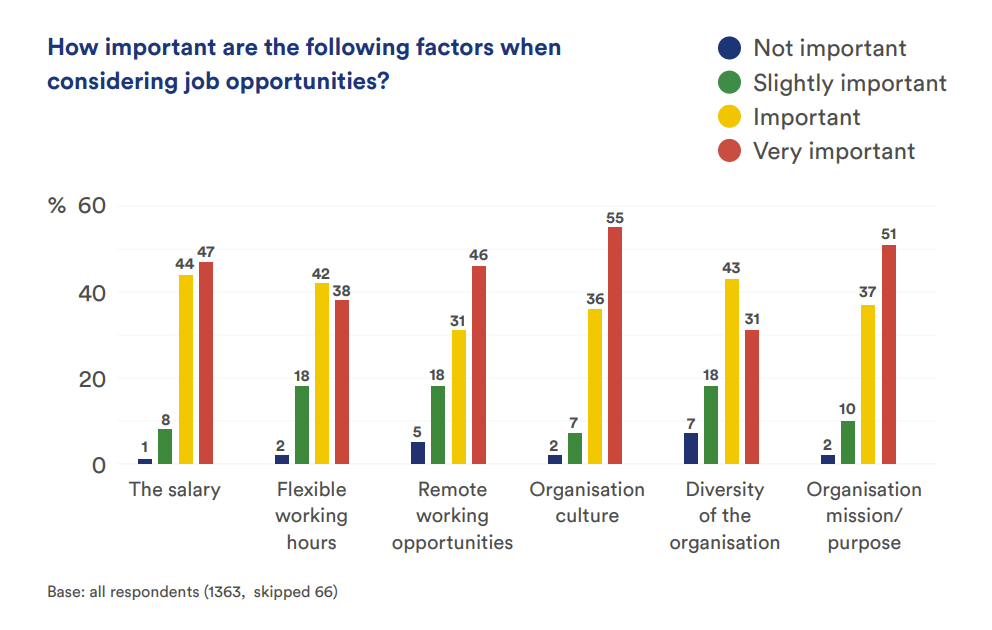Article menu
A good salary is essential to attracting candidates and increasing your charity’s diversity – more so than ever during a cost-of-living crisis. But what other employee benefits and perks do candidates prioritise when looking for a new job? And are you aligned with industry standards?
CharityJob Benefits Report 2023
The CharityJob Benefits Report 2023 shares insights from a survey of candidates who’d used our site to look for jobs in the past year. We received over 1,400 responses.
The report covers:
- which benefits CharityJob candidates receive in their current roles (including differences between charity sector respondents and those working in other sectors)
- which benefits CharityJob candidates want, and which ones they prioritise when considering job opportunities
- the type of work they’re looking for
- differences between demographic groups
- recommendations for recruiters.
These findings complement the CharityJob Salary Report 2023, which provides insight into average salaries and trends across the sector based on data from all jobs posted on our site in 2022.
Key insights from the CharityJob Benefits Report 2023
1. The benefits most commonly received by charity sector employees
Most candidates working in the charity sector said they receive the following:
- 25+ days annual leave (not including bank holidays) (80% of these respondents)
- Remote working options (79%)
- Flexible working hours (71%)
- Free tea/coffee (53%)
- Training and development opportunities (53%)
- Mental health and wellbeing support (50%)
2. The top priority benefits for candidates
Most respondents selected the following three factors as a priority:
- 25+ days annual leave (not including bank holidays)
- Flexible working hours
- Remote working options
After these, the most frequently prioritised employee benefits were:
- Training and development opportunities
- A four-day work week on full-time pay
- Health insurance or private medical insurance
- Mental health or wellbeing support
- Clear progression pathway
- Above statutory paid sick leave
- An enhanced pension
3. Some benefits are highly desired but received by only a small proportion of candidates
Despite high demand, only a few respondents received the following:
- A four-day work week on full-time pay
- Health insurance or private medical insurance
- A clear progression pathway
- An enhanced pension
To stand out among peers in the job market, charity recruiters should consider offering these sought-after employee benefits.
4. Candidates highly value an organisation’s culture and mission
We asked candidates to rate the importance of a range of factors when considering job opportunities.
The results show that all these factors were important to candidates. But organisation culture and organisation mission/purpose stood out in particular, with more than half of respondents finding them ‘very important.’
When looking at ‘very important’ and ‘important’ rankings together, salary, organisation culture and organisation mission/purpose emerged as the top factors, selected by 91%, 91% and 88% of respondents respectively.
So while salary is a key factor in their job choices, CharityJob candidates also aspire to work for a cause they’re passionate about, in a positive and supportive working environment.

5. Different groups have different preferences
Certain employee benefits were critical for most candidates (25+ days annual leave, flexible working hours and remote working options). However, the relative importance of specific benefits varied across demographic groups.
For example, flexible working hours was the most important benefit for those with caring responsibilities. For those without caring responsibilities, 25+ days annual leave was the most important benefit.
Salary was more important in job decisions for those aged 25 to 35 than for those in other age groups. For those aged 24 and under, an organisation’s mission or purpose was the most important factor. And those aged 36 to 44 tended to place more emphasis on flexible working hours than those in other age groups did.
Want to learn more?
Download the full CharityJob Benefits Report 2023 for further insights and to find out how you can attract more candidates.
Use CharityJob’s Organisation Profile feature to showcase your employee benefits
If you’re recruiting, make sure you sell the full package – be clear about the employee benefits and perks you offer. Even better, consider expanding your benefits package to better meet candidates’ needs.
Use the organisation profile feature on CharityJob to showcase who you are, what you offer and why it’s great to work for you.
Having trouble finding the perfect candidate? Learn how posting a job on CharityJob can help you connect with highly qualified individuals. Our recruiter platform is designed to attract a diverse pool of passionate and skilled candidates, making it easier for you to identify and recruit the right person for the role.
Tags: charity recruitment, charity sector, charity sector recruitment, charity sector salary, employee benefits, pay and benefits




